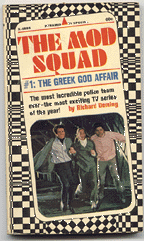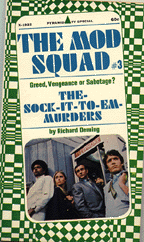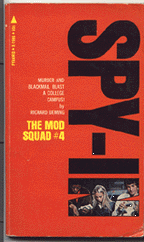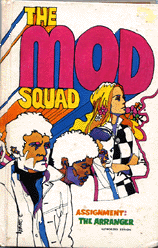MOD SQUAD MEMORABILIA FROM MY COLLECTION!
















Dark curly hair. Brooding eyes. Gravelly voice. . . .
Michael Cole played the somber, introspective Pete Cochran of ABC's long-running hit show THE MOD SQUAD. If you remember Pete, if you were one of the show's countless fans during its heyday, then you probably recall what he was like then. There are changes in the Michael Cole of MOD SQUAD days and the Michael Cole of today. Appearance-wise, however, one significant point is as obvious now as it was then.
If you were a fan, you surely remember now, and must've held your breath at the time when, during one of the later summers of the show's five year run, Cole was in a serious auto accident. Nearly severing his left eyelid from his face it was, as he put it, "litterally laying at the side" of his nose. Surgery saved the lid and its usage was replaced; but a very noticeable scar remained, coming from above his eyebrow and back out from the eye's corner, appearing to add a slight squint, especially when he smiled. Teenage women all across America exhaled in relief and continued to dream of that rough face, now scarred yet in some ways more masculine. . . .
Today the face is still rough, with a virile "I've been around" look to it; the build is still medium, now seesawing between middle-aged and toned; the hair--though cropped short and streaked with gray--is still curly. The voice is unchanged. He wears glasses. Those once-dreaming teenagers who sighed over him then are now adults with adult lives which no longer center around their favorite Tuesday night TV show and the fantasy of Michael Cole.
And Michael Cole knows this. He knows that being a teen idol didn't give him an automatic ticket down Easy Street. But he had to find out the hard way. "Everything bad that's happened to me is my fault. I don't blame anyone else for anything."
The scar on his face is still very evident and the ensuing squint becomes more discernable as he gets into his thoughts; neither has faded over the years. Now, however, his words lay bare deeper scars, invisible to sight, though very obvious to the ear.
"I got in a lot of trouble," he relates. "You can't imagine how unreal it was to come from nothing (money-wise), then be able to say `I want that house' and just buy it. I grew up with my mother and brother. She'd been divorced and we had nothing, but we didn't really know it because we had each other. She was great. She kept us together." His voice stumbles over the mention of his mother and the loving family she created.
"I mean I had nothing. I was in acting school and they let me sleep on a cot on the stage. That was my bedroom for awhile. I worked in plays." He laughs and his eyes light up. "The problem was that the technicians would come in early, after drinking and everything, and they'd wake me up. I'd have to go into the bathroom and sit on the toilet with my head back like this," he demonstrates the awkward position, "to get any more sleep."
He's very matter-of-fact about it all. "It wasn't bad, really. But I needed a job, I needed money, so I went to Las Vegas. Las Vegas is important because that's where I met Paula."
Paula is Paula Kelly, a singer, once member of The Modernaires, and the woman who was to become the wife of a teen idol. But he wasn't yet who he was to become.
"A friend introduced us. Paula was so beautiful and she was a star. I was shy, probably didn't say two words. I later found out that she told my friend, `Thanks for picking me such a live one.'" He grins, kind of a lopsided, troublemaker expression, his eyes twinkle, and the squint to his left eye becomes extremely pronounced. He looks like a big kid.
It's key to note here how Cole reacts to the mention of clearly the two most important women in the course his life has taken thus far. He reveres them both--his mother, now deceased, over whom he gets misty-eyed and unnecessarily defensive of in the course of old memories; and the woman he married and still cares for, and whom he defends with equal ardor. Paula, the mother of his adored daughter, brings a softness to his voice and makes him smile.
"MOD SQUAD was such an explosion, it was a groundbreaker. We had no idea at the time. There were bags and bags of mail--those big things--always in the hall outside Aaron Spelling's office." His voice quietens. He's leaning over the table intently staring at his hands. His forefingers and thumbs are pressed together in a triangle shape, the rest of the fingers spread out evenly--something which seems to be a thinking gesture for him.
"It actually changed people's lives. I remember one letter from a girl who said she had been on drugs, on the streets hooking. But because of our show, she said she turned herself around and became a social worker." So many years later, the memory still makes him emotional. "As far as I know, she's still out there somewhere."
A faceless young woman on a path to self-destruction was helped towards a better life by Michael Cole, a sensitive young actor who had it all with no idea as to how to handle the onslaught of notoriety and money. He was also on a self-made path to destruction, but who was going to help him? He didn't know what to do with the easy life, a life he'd never before known. There were years of anger, confusion, lots of drinking, senseless indulgence and growing dissipation of mind, spirit, and body.
How is it, then, that he now sits in the dining room of his spacious, unpretentious hilltop home in California? How is it that his quiet conversation is liberally spotted with God and Christ's meaning in his life? How is it that he drives a shining emerald green Mercedes? Most amazingly, how is it that there seems to be little anger left and that he appears on the verge of being at peace with himself?
Back to that time. The explanations are found in simply listening to him talk. "It was all so unreal then. When Paula and I were in the car accident, we hit a slick spot on Laurel Canyon Freeway and went into the side of the mountain. I went through the windshield twice and Paula was hurt, too.
"She was saying, `Michael, your face, your eye!' and I was trying to see if she was okay. That was beautiful, that we thought about each other. But they put us in separate hospitals--I was in Cedars--and we had to talk on the phone. I was so happy that nothing had happened to her beautiful face. She was probably in more pain than I was, though, because I was so doped up.
"There were people in and out of my room all the time. Everybody came to see me--family, old friends, Sammy Davis, Jr. called and told me, `Don't go my route'. . .he meant the eye. There were bars set up, hors d'oeuvres tables along the walls. People would come in and party and drink, stay till all hours. I couldn't drink much because they had me all doped up but one girl brought in brownies that were so loaded I thought I laughed for weeks." He starts laughing now. "I'm sure it was only a few hours but it seemed like weeks."
He looks down at his fingers, once again splayed on the table and returns to a very serious tone. "One night after everyone left, about eleven, I got up and looked in the mirror. It was horrible. I thought, `Michael, this might be it. It might be over.'"
His eyes come up, a slow grin spreading through them and this seems like a strange, inopportune time to be smiling. "But then I started doing one of these numbers," and he shows how he covered the eye, trying to see what he'd look like. "I thought maybe it'd be an interesting image."
He probably wasn't really that philosophical about the possible loss of an eye, an adored face in TVdom, a blooming career with endless possibilities and an exciting, fast-lane lifestyle. He seems like a defensive man with a "Who cares?" defense mechanism, a deep-down instinct of survival.
All speculation, of course, because the eye was saved and the face returned to TV for a few more years. After MOD SQUAD was cancelled, Cole floundered, doing numerous guest appearances on episodic TV and plays across the country. He relates one experience while on the play circuit.
"We were in a small town. The weather was bad and it looked like we might not have any audience. We decided to do it anyway, and give it all we had, use it as a rehearsal if it came to that. It turned out we did have a few people, and there were these three old ladies, one was celebrating her eightieth birthday. This was their night out. They'd been shopping nearby and decided to treat themselves to a play. I don't know if they knew who I was."
He runs a forefinger up the side of his nose, a common gesture for him, then carefully resituates his glasses. "During the intermission, I had a stagehand go out and get a dozen red roses, and beer and wine and stuff for the crew and all. After the play we had a birthday party for this woman." He stops talking a minute and takes a deep breath. His next words are thick, halting. "She cried, I cried. It meant a lot to both of us. It's still a very special memory."
How could any man who cries at the birthday party of an 80-year old woman--a stranger--become difficult, hard-drinking, belligerent? "I was afraid. I remember waking up in the middle of one night years later. Something was gripping me. It wasn't a dream because I was wide awake. I walked around the room yelling, `No! No!' I didn't know what it was but it was real. The only way it would go away was when Paula held me and told me it was okay, that she loved me. . .sort of a mini-exorcism."
This was the beginning of Michael Cole's process to retrieve his soul from a life of negativity and downward spiralling. It wasn't to be an easy process, nor would it always seem as if it was working. He knew, however, that things had to change. And he began to realize he didn't have to do it all alone anymore. There was a power greater than his, and even greater than those people around him who loved him.
There was an even larger love.
Love notwithstanding, though, Paula could only handle so much of the highs and lows of such an overwhelmingly-emotional man. Michael was changing, and his emotions and moods skyrocketed even more than usual. "She didn't do anything wrong," he rushes to assure, "I was just difficult. She couldn't take anymore."
Then came a period when he did nothing. "Nothing. People close to me were starting to die--my manager, my mother, others. It was hard to take. People'd say, `Michael, get off it.' I didn't want to. It wasn't time yet. I didn't want to get angry but they didn't understand and I knew, I just knew, that when it was time, I would really know it."
Michael is an avid reader, quotes passages from Dylan Thomas, the Bible, and anonymous writers who touched him in some way. He quit school in the 10th grade and eventually went back, but never finished college; yet he speaks with a scholar's insights. For someone who says he's done nothing for quite some time, the wooded natureland area in which his home is situated attests to the fact that, nonetheless, he hasn't been in wont of the material things in life. "I had a great business manager. That was very important. Without him, I wouldn't have this house right now."
Through the professional insights of a smart business manager, Michael was able to hold onto his physical surroundings despite the deterioration of his emotional life. The process which brought him to an always challenged but ever-growing faith in the Almighty was more complicated though no less planned. He believes the Lord has always been a guide in his life and he has finally begun to allow the Lord's hand to move him where he believes he was always meant to go.
It's been over twenty years since Michael's accident, since that, nameless young woman's letter, since THE MOD SQUAD left television's weekly consciousness, since the old woman's birthday party, and since he lost his mother to death and his wife to divorce. Now, though, he seems to have peace of mind, a deepening spiritual understanding of his own way through life, and a friendship with his ex-wife.
Is it time yet for Michael Cole to "get up?"
"Now it's time. I just feel it. It's all in God's time, and His is not ours. It's time to get back into acting, if acting will have me. I believe God gave me a gift, and I've realized that I'm wasting it. I'm going to start doing some guest appearances on TV and tryouts for other shows. We'll see."
Indeed. He recently had a standing part with the ABC daytime drama GENERAL HOSPITAL, playing Harlan Barrett, a wealthy, charming Fortune 500 scion who wheeled and dealed and caused upset in the lives of the show's mainstay family, the Quartermaines.
What does he have to say about his first juicy role since THE MOD SQUAD? "My character was a little vague. Nobody knew what he was up to. He was rich, fun but he could be a you-know-what." Sound like a possible autobiographical character study?
Always the attentive host, Michael offers to cook dinner, spaghetti, and pours an unrequested second glass of soda for this reporter. At a murmured, "Thanks," his automatic reaction sums up the roller coaster emotions and perseverance, endurance, and grit which have seen him through life this far.
"That's okay. It's all in God's time."
Linda Alexander's Bio
As an award-winning photo-journalist, LINDA ALEXANDER has sold celebrity articles to SOAP OPERA UPDATE, written for THE CONNECTION --a Christian newsletter, and hosted a MD newspaper interview column with over 30,000 readers. Among others, she has written for national publications: THE WASHINGTON TIMES, CONTEMPORARY CHRISTIAN MUSICIAN and SPOTLIGHT MAGAZINE. She has extensive administrative and P. R. experience, edits newsletters, and acts as publicist for authors, TV, and music performers, (sample clients: Kevin DiSimone: jingle writer/performer/backup singer/keyboardist for Barry Manilow; Patricia Gaffney: bestselling novelist; Carey Cromelin, William Bell Sullivan: actors, GUIDING LIGHT; Patti Reese: Las Vegas/C&W performer). Her interivew experiences cross various performance lines: film (Robert Stack, Jim Varney, Peter Coyote, others); television (Chad Everett, others); soap opera (most of the cast of "Guiding Light" & Another World", others); oldies music (Gary Puckett, Lou Christie, Tiny Tim, others).
Her first book, an international political biography, THE UNPROMISED LAND, published in June, 1994. An essay, "Linda's Story," appeared in HITCHHIKER'S GUIDE TO THE ELECTRONIC HIGHWAY, a book by Pamela Kane, published in June, 1994. Various contributions--an overview of the romance genre of film, a biographical piece on actor Robert Taylor, and interviews with actors Peter Coyote and Jim Varney--were written for inclusion in the November, 1995, international film commemorative, 100 YEARS OF MOVING PICTURES.
A new book is scheduled for release in July, 1997, titled, DOROTHY FROM KANSAS MEETS THE WIZARD OF X, an inside, slice-of-life look at the lives of adult film stars.
As a journalist and human rights activist, ALEXANDER appeared on national TV on: THE SALLY JESSE RAPHAEL SHOW--intimate relationships; ATTITUDES--female business relationships and friendships; THE OPRAH WINFREY SHOW--as a survivor of child abuse. She participated in a child abuse panel sponsored by MD House of Representatives Delegate (now Senator) Jean Roesser; represented National Child Rights Alliance at a 1991 meeting for the creation of a national child rights committee; co-founded a group to save an historic theatre, coordinating a benefit with soap star co-hosts and attended by approximately four hundred people. In 1991, she organized a celebrity play reading to benefit National Child Rights Alliance. Due to its success, a new play was written and read in Fall, 1992, to benefit The Salvation Army Hurricane Relief Fund. Both plays were co-written by ALEXANDER and well-received by audience, and readers--all were professional TV actors.
She was heard on West Coast radio, SOAP OPERA'S A-ONE PEOPLE, discussing East Coast soaps, and lectured elementary kids on life as a professional writer. Her Washington, DC, seminar, "REPORTING ON CELEBRITIES: GETTING A GREAT INTERVIEW", given through a non-credit educational group, is in expansion. She is a past editor of Washington Romance Writers; a member of National Writers Association, and Romance Writers of America; and former Montgomery county contact for People Against Child Abuse, a child abuse prevention organization.